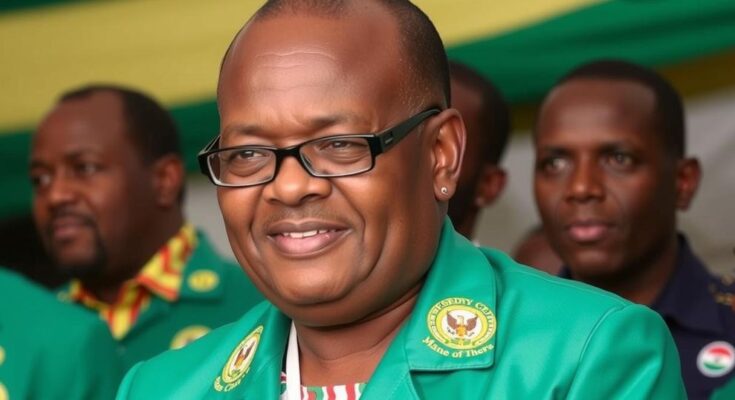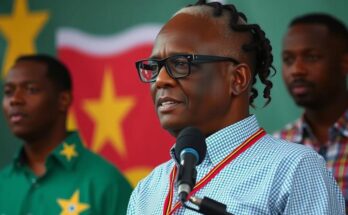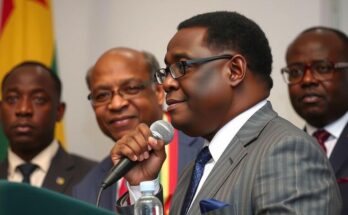Vice President Mahamudu Bawumia conceded defeat in Ghana’s presidential election, which marked the end of the ruling NPP’s two-term governance overshadowed by economic challenges. John Mahama of the NDC emerged victorious, reflecting the electorate’s desire for change. The election highlighted significant economic issues, including high inflation, contributing to the outcome. Mahama garnered approximately 56.3% of the votes, leading to celebrations among his supporters as he prepares to reclaim the presidency.
In a significant turn of events in Ghana’s political landscape, Mahamudu Bawumia, the ruling New Patriotic Party’s candidate and Vice President, conceded defeat in the recent presidential election held on Saturday. This election marks an end to two terms of governance by the NPP, led by President Nana Akufo-Addo, which has been synonymous with Ghana’s most severe economic challenges in years, including soaring inflation and a debt default.
During a news conference on Sunday, Mr. Bawumia acknowledged the electorate’s decision, stating, “The people of Ghana have spoken, the people have voted for change at this time and we respect it with all humility.” He confirmed that he had reached out to his opponent, the National Democratic Congress (NDC) candidate and former president, John Mahama, to extend his congratulations.
Celebratory scenes unfolded as supporters of Mr. Mahama gathered outside the NDC headquarters in Accra, honking horns and cheering for their candidate. Mr. Mahama confirmed that he had received Mr. Bawumia’s congratulatory call regarding his “emphatic victory.” According to Mr. Bawumia’s own calculations, Mr. Mahama won decisively, not only securing the presidency but also leading his party to victory in the parliamentary election.
The election results reflected a strong sentiment of dissatisfaction with the current economic situation. Ghana has endured a series of fiscal challenges, culminating in a $3 billion bailout from the International Monetary Fund, following a default and the devaluation of its currency. NDC spokesperson Sammy Gyamfi reported that their internal assessment indicated Mr. Mahama amassed 56.3% of the vote, in stark contrast to Mr. Bawumia’s 41.3%. “It is very clear the people of this country have voted for change,” said Gyamfi.
Political observers noted that both parties had appointed agents to oversee polling stations, contributing to a transparent electoral process. Although official results from the electoral commission are anticipated by Tuesday, preliminary data suggest a decisive victory for the NDC. Ghana’s political history has been characterized by a stable democratic process, with the two primary parties, the NPP and NDC, alternating power since 1992. Mr. Bawumia had aimed to secure a third consecutive term for the NPP under the campaign slogan “Break the 8,” yet he was met with pervasive criticism regarding the economic performance of President Akufo-Addo’s administration. Despite a slight decline in inflation rates, economic issues remained a top priority for voters, facilitating Mr. Mahama’s return after unsuccessful attempts in previous elections.
Ghana’s political history has been shaped by the consecutive governance of the NPP and NDC parties, particularly after the reinstatement of multi-party politics in 1992. This electoral cycle has unfolded against a backdrop of significant economic turmoil within the country, characterized by high inflation rates, substantial debt, and recent defaults. Consequently, these factors have influenced voter sentiments, leading to a demand for a shift in leadership. The NPP’s governance, marked by these economic challenges, has struggled to maintain public confidence, opening the door for an opportunistic campaign by former President Mahama of the NDC, who previously served from 2012 to 2017.
The recent presidential election in Ghana symbolizes a decisive shift in the nation’s political landscape, with Vice President Mahamudu Bawumia conceding to the former president, John Mahama, amid widespread economic dissatisfaction. Mr. Mahama’s victory underscores the electorate’s desire for change following years of economic hardship under the NPP. Looking ahead, this election could serve as a critical turning point for Ghana’s economic recovery and political stability as the NDC assumes power once again.
Original Source: www.voanews.com



